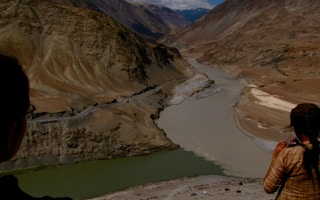As climate change impacts strengthen and water security becomes a growing concern in both India and Pakistan, India has proposed renegotiating a six-decade-old water-sharing treaty - a move Pakistan so far opposes.
But renegotiation - or at least tweaking the treaty - may be as important for Pakistan as India, environmental experts say, as a dam-building push in both countries, rising water demand from growing populations and faster swings between drought and floods make water rights and access an ever-bigger worry.
The 1960 Indus Waters Treaty - mediated by the World Bank - splits the Indus River and its tributaries between the South Asian neighbours and regulates the sharing of water.
The treaty has withstood standoffs, skirmishes and even wars, but diplomatic relations between the two foes have been reduced since 2019 due to tensions over disputed Kashmir, and a feud over water sharing and supplies is now intensifying.
While each country has dozens of hydropower projects in the Indus Basin currently operational or under construction, the ongoing water dispute centres around Pakistan’s opposition to India’s 330 megawatt (MW) Kishanganga project on the Jhelum river and the 850 MW Ratle project on the Chenab river.
Pakistan is seeking resolution at the Court of Arbitration in The Hague over its concerns with the two projects, while India has asked its neighbour to enter into bilateral negotiations to modify the Indus Waters Treaty, to stop third parties intervening in disputes.
Under the current terms of the treaty, the two countries can resolve disputes either through a neutral expert appointed by the World Bank, or at the Court of Arbitration.
Pakistan has taken the latter route because it is concerned that some of India’s planned and commissioned hydropower dams will reduce flows that feed at least 80 per cent of its irrigated agriculture.
India, however, says that the way it is designing and constructing the hydroelectric plants is permitted under the terms of the treaty.
Analysts on both sides of the border say Pakistan is unlikely to reopen the agreement with India bilaterally because, as the smaller nation, it believes the involvement of international institutions strengths its position.
“
Further depletion of the stream flow will jeopardise the food, energy and water security in the entire Indus basin.
Shakil Romshoo, professor, Kashmir University
Yet some academics think the agreement should be reviewed to factor in climate change impacts for the first time.
For example, Daanish Mustafa, a professor of critical geography at King’s College London, said that doing so could ultimately benefit Pakistan, as India would be expected to take warming impacts into consideration when designing hydropower projects and making decisions about water.
A 2019 study in the journal Nature by Pakistani and Italian researchers noted that climate change was “quickly eroding trust” between the two nations and that the treaty “lacks guidelines … (on) issues related to climate change and basin sustainability.”
However, Ali Tauqeer Sheikh, an environmental and development analyst based in Islamabad, said increasingly worrying climate change pressures are currently “the best instrument available for ensuring water cooperation and regional stability”.
Rather than “playing as victims of climate change”, the two nations should work together to create policies that work for both, he said, adding that the treaty should be updated to cover climate-related concerns from melting glaciers to more intense rainfall.










